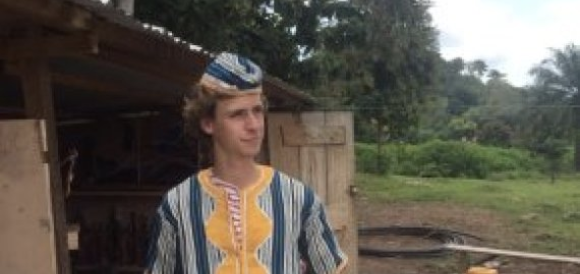Text: Eva van der Graaf
‘I was a bit disappointed in the nature in the Ivory Coast. There is hardly any forest left; the only tropical rainforest was in the west of the country but that was a long way away from me. That statement is a bit harsh, of course, given that I am actually working for the sector that’s responsible for the destruction of the tropical rainforest.
I worked for ECOM, a global merchant in coffee and cocoa, looking at cocoa farmers’ land rights for them. In the Ivory Coast, many land rights are registered in a traditional, informal way. That makes boundaries unclear and causes conflicts about the inheritance of land. In 1998, a law was introduced requiring land rights to be formalized but that has only actually been done for four per cent of the land, mainly large plantations. It is unaffordable for small-scale farmers. So I worked with a trainee from France investigating how ECOM could help the farmers formalize their land rights.

Land as collateral
My main daily task was to collect information. I would visit government bodies, land surveyors and farmers. I also set up a survey, a kind of market research covering 500 farmers. The idea is that the survey will also provide data for my thesis. In my thesis, I’ll be looking at the “collateralizability” of land — the extent to which land can be used as collateral. A lot of small farmers don’t have access to credit, and formal land rights could improve their chances of getting a loan.
I went out a lot in Abidjan on my days off. It has a big French expat community, which the previous intern introduced me to. I went to concerts, had tennis lessons, learnt French and often went out for meals with my housemates. In the weekends I travelled around a bit. One weekend, I hired a motorbike with a friend. You just go to a village, find some random person and hire their bike for 15 euros for the weekend. Except I’d never ridden a motorbike before, so I did need a one-hour lesson first.

Child labour
One of my learning objectives was to find out more about certification. So I visited the exporter for Tony Chocolonely and a number of their cooperatives. I was struck by how difficult it is to monitor quality labels. The farmers had never even heard of some of the farming methods and management terms that I mentioned, such as integrated pest management. Child labour is another tricky subject. It’s not clear-cut. I have seen children working on plantations but sometimes they were just helping out, like you or I might help with the mowing. Of course I don’t want to defend the dangerous, intensive forms of child labour but it’s not fair either to paint farmers as slave drivers exploiting their own children.
I found it striking that while our company was making efforts to increase productivity, the farmers would often say: “The little I earn is enough”. We Westerners want progress but the fact of the matter is that the farmers often see things differently.’

